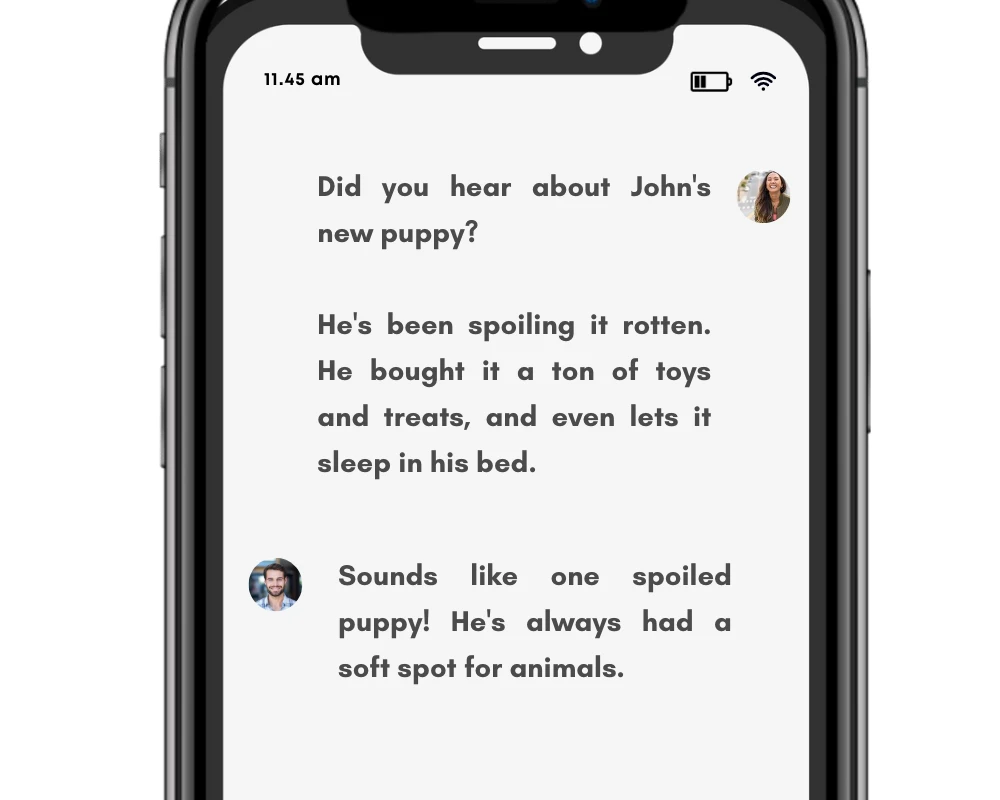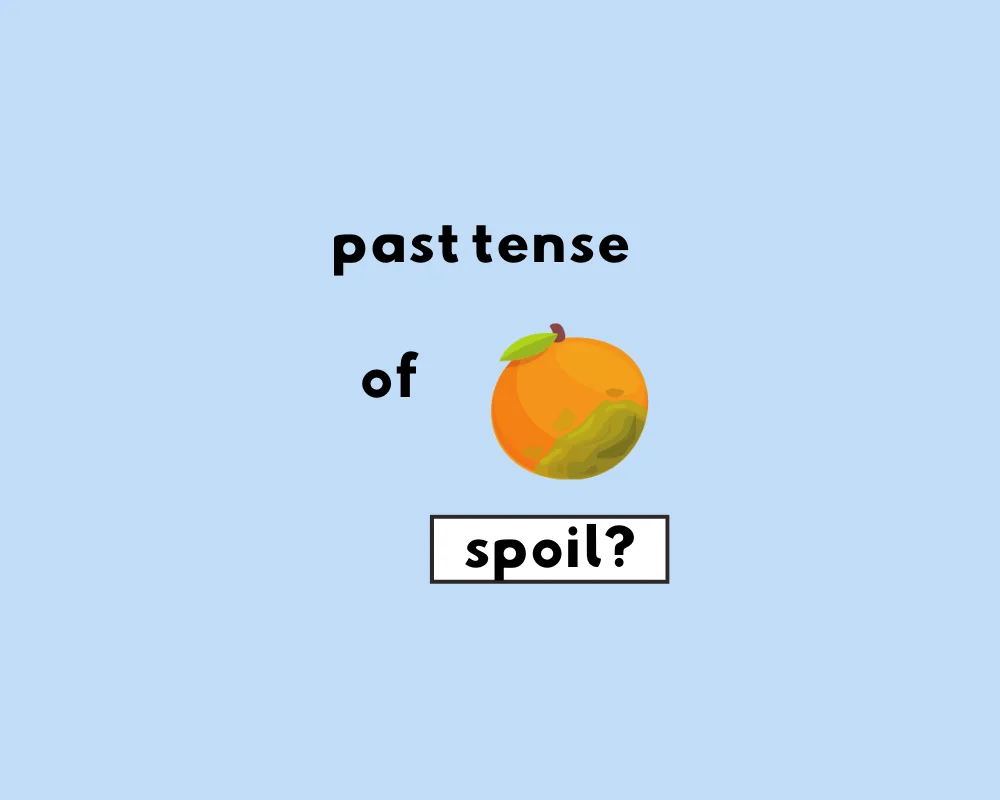
What’s the past tense of “spoil”?
The verb spoil (rhymes with boil), is more complicated than the standard past tense verb. The consensus, according to the internet, is spoilt is no longer. We might say spoilt is, well, spoilt. And now, the preferred past tense in either case is spoiled.
With that being said, UK English still uses spoilt, mostly as the past participial form of spoil. Spoilt still shows up in the dictionary as a past tense and participle of spoil—so while spoiled might be trending, it’s still acceptable to use spoilt as a past tense or participial form of spoil.
Forms of spoil
| present | past | future | |
| simple | I spoil | I spoiled/spoilt | I will spoil |
| continuous | I am spoiling | I was spoiling | I will be spoiling |
| perfect | I have spoiled/spoilt | I had spoiled/spoilt | I will have spoiled/spoilt |
| perfect continuous | I have been spoiling | I had been spoiling | I will have been spoiling |
Quick Tip—Past tenses
The meaning of the verb to spoil is “to destroy or reduce the pleasure, interest, or beauty of something: He tried not to let the bad news spoil his evening.” In other words, when something is spoiled, it’s no longer of the same value as it was prior to having been spoilt. Also, that sentence points to the distinction between spoiled/spoilt in its past tense and past participle forms: the past participle require the auxiliary verb, has/have, whereas the simple past tense does not.
| base verb | past tense | past participle |
| lean | leant/leaned | leant/leaned |
| leap | leapt/leaped | leapt/leaped |
| learn | learnt/learned | learnt/learned |
| spoil | spoilt/spoiled | spoilt/spoiled |
| spill | spilt/spilled | spilt/spilled |
| deal | dealt | dealt |
British English uses the earlier, more ‘irregular’ English, which prefers irregular verb (and noun) forms. When in doubt, stick to the form that applies considering the geography. Also, for the most part, English speaking countries outside of the UK and the US use British/UK English (this is a rule of thumb, each country is difference.)
Examples of the word spoil used in sentences
1. I won’t tell you what happens in the last chapter—I don’t want to spoil it for you.
2. Don’t eat too many nuts—you’ll spoil your appetite.
3. Don’t let him spoil your evening.
4. Don’t let the bad weather spoil your trip.
5. I don’t want to spoil things for everyone else.
Examples of the word spoilt used in sentences
1. The performance was spoilt by the constant noise from the audience.
The preferred past tense of “spoil” is “spoiled.”
In UK English, “spoilt” is still commonly used, especially as a past participle.
Avoid assuming “spoilt” is entirely incorrect, as it’s still acceptable in UK English.
2. Our camping trip was spoilt by bad weather.
3. Have I spoilt the day?
4. The bad weather really spoilt things for us.
5. I’m sorry I spoilt the weekend but I’m having a crisis.
Examples of the word spoiled used in sentences
1. Her selfish behaviour completely spoiled the evening.
2. The whole park has been spoiled by litter.
3. The tall buildings have spoiled the view.
4. He really spoiled me on my birthday.
5. The fight spoiled the party.
Practice questions: forms of “spoil”
| Questions | Answer options: |
|---|---|
| 1. True or false: “To spoil” can be a regular or irregular verb. | a. true b. false |
| 2. True or false: “Spoil” looks the same in the present and past tense. | a. true b. false |
| Choose the correct verb form to complete each sentence: | |
| 3. Don’t let him ___ your evening. | a. spoil b. spoiling c. spoils |
| 4. The whole park has been ___ by litter. | a. spoils b. spoil c. spoiled |
| 5. I’m sorry I ___ the weekend but I’m having a crisis. | a. spoilt b. spoiling c. spoils |
| 6. You’re ___ everything! | a. spoil b. spoils c. spoiling |
| 7. I ___ my appetite if I don’t stop snacking. | a. spoil b. will spoil c. spoiling |
Answers
- a
- b
- c
- c
- a
- c
- b
Synonyms of spoil
- ruin
- damage
- wreck
- harm
- impair
- adversely affect
- corrupt
- taint
- contaminate
- decay
- decompose
- go bad
When writing, consider your audience. If writing for a global audience, “spoiled” is a safer choice. If writing for a UK audience, “spoilt” is perfectly acceptable.
Origin of the word spoil
From etymology online on spoil (v.):
c. 1300, “to strip (someone) of clothes, strip a slain enemy,” from Old French espillier “to strip, plunder, pillage,” from Latin spoliare “to strip, uncover, lay bare; strip of clothing, rob, plunder, pillage,” from spolia.
Learn more about verbs
Sources
- Origin of the verb, spoil.
- Spoiled used in sentences, spoil/spoilt/spoiled.
Work Sheet
According to the blog post, what is generally considered the preferred past tense of the verb “spoil”?
In which major English-speaking region is “spoilt” still commonly used, particularly as a past participle?
Is the form “spoilt” considered completely incorrect in all contexts, according to the post?
When using the simple past tense of “spoil,” which form does the post indicate is generally preferred?
Which of the following correctly represents the acceptable past tense/past participle forms listed in the table provided in the post?
He accidentally the surprise party by mentioning it early.
In UK English, the form is still widely used as a past participle.
The fruit was left in the sun and completely .
Our picnic was by the sudden rainstorm.
I think I have the dough by adding too much flour.
Frequently Asked Questions
What is the preferred past tense?
+
Is the word “spoilt” incorrect?
+
Where is “spoilt” mainly used?
+
Spoiled or spoilt: How to choose?
+
Past tense vs participle: what’s the key?
+
Yash, D. "What’s the Past Tense of Spoil? Spoiled or Spoilt?." Grammarflex, Jun 18, 2025, https://www.grammarflex.com/whats-the-past-tense-of-spoil-spoiled-or-spoilt/.











